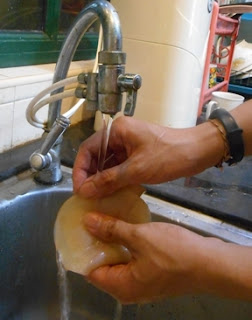5 Common Mistakes of Novice Brewers
Mistake No 1: Washing the Mother Scoby
Novice brewers always come to me and ask, should I wash the
mother Scoby? It smells and there are lots of gooey matter on the Scoby.
Simple answer, No; you don’t have to wash the Scoby. In fact the brown gooey matters are perfectly
harmless dead yeast. Also, washing will
remove the yeast on the Scoby and might even stress out the Scoby due to
exposure to contaminants in pipe water such as chlorine.
Dont wash your mother Scoby
Mistake No 2: Sealing the container tightly shut/ Brewing in
an airtight container
It is important to seal the container during the brewing
process but it has to be loosely sealed with bands and also breathable to allow
a smooth fermentation process.
During the fermentation process, it is vital for the
circulation of air in and out from the brewing vessel.Sealing the brewing container shut will halt the fermentation
process due to the excess carbon dioxide and the lack of oxygen.
Dont seal the container tightly shut
Mistake no 3: Failure to securely cover the mouth of the brewing
vessel
If the cloth on the mouth of the fermentation
container/vessel is not fasten securely either with a rubber band or a rope,
there is a high chance that fruit flies will wiggle themselves into the
container and start laying eggs on top of the Scoby.
Make sure those covers are tight when u start brewing. The sight of floating fruit fly larvae on
kombucha is not a sight to behold. (further reading on fruit fly can be found in
my article: enemies of Scoby)
 |
| Bad Practice: The mouth of the vessel is not securely sealed with the rubber band |
 |
| Good Practice: The mouth of the brewing vessel is securely sealed with a rubber band |
Mistake No 4: Brewing kombucha in a plastic container
This is by far the worst mistake ever. Organic acid will
slowly leech the plastic into the drink. At the end of the day brewed kombucha
will be contaminated plastic particles.
I cannot emphasize more on the importance of using glass
containers during the brewing process.
Mistake No 5: Brewing in a poorly ventilated area
Brewing in a poorly ventilated area usually leads to the
increase in humidity in the brewing vessel. When that happens, this will
encourage the development of mold in the brew.
In a severe case, a novice brewer I knew unwittingly brewed kombucha in a
cabinet. Sure enough all his brew was contaminated within a space of 3 days by a layer of mold.
 |
| Brewing in poorly ventilated area promotes growth of mold |






Hi, could you sell me some scoby? Mail me at chkken99@yahoo.com.sg
ReplyDelete